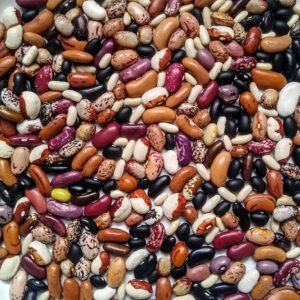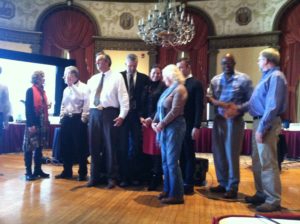
 I just returned from the National Organic Standards Board (NOSB) meeting in Providence, Rhode Island, where OSA was invited to give a formal presentation on the topic of organic seed. The meeting provided an important opportunity to share data from our State of Organic Seed report and updates from our working groups, including formally introducing the board and audience members to Organic Seed Finder, a new seed database for the organic community.
I just returned from the National Organic Standards Board (NOSB) meeting in Providence, Rhode Island, where OSA was invited to give a formal presentation on the topic of organic seed. The meeting provided an important opportunity to share data from our State of Organic Seed report and updates from our working groups, including formally introducing the board and audience members to Organic Seed Finder, a new seed database for the organic community.
If you follow NOSB discussions and decisions, you know that seed is just one of many issues the board attends to, yet it’s a critical one that must remain a priority. Why? Because the NOSB advises the National Organic Program (NOP) on how to implement and enforce rules, including the organic seed requirement. This means the NOSB provides recommendations on how the NOP can better support growth in the organic seed sector, help farmers identify appropriate seed for their operations, and address enforcement issues. The NOP has yet to publish its final guidance on the organic seed requirement, and OSA continues to advocate for the inclusion of these recommendations.
When organic seed is available to meet diverse needs, organic farmers succeed – and so does the larger organic industry. OSA recognizes that increasing commercial availability of organic seed demands consistency in enforcing the rule, further investments in organic seed, producer and certifier education, producers’ willingness to trial new varieties, among other efforts. We are making progress in all areas.
As we make progress, we remain on track toward continual improvement, a principle embedded in the organic standards. Increased availability and use of organic seed means more certified organic acreage, fewer organic farmers relying on seed that’s produced in conflict with organic principles (many conventional seed crops are grown with heavy applications of pesticides), and more farmers meeting the NOP’s requirement to use organic seed – all factors in strengthening organic integrity.
And this is one of the board’s most important responsibilities: to look out for the integrity of the organic label. From the NOSB’s policies and procedures manual:
The NOSB’s vision is an agricultural community rooted in organic principles and values that instills trust among consumers, producers, processors, retailers and other stakeholders. Consistent and sustainable organic standards guard and advance the integrity of organic products and practices.
Integral to seed integrity is the genetic purity of seed used in organic systems. This was the second reason I wanted to attend last week’s meeting. On the agenda was the NOSB’s GMO ad hoc subcommittee.
Because OSA has long maintained that organic food integrity begins with organic seed integrity, I publicly applauded the NOSB for taking seriously the threat that genetically engineered (GE) crops pose to the integrity of seed used in organic systems (and, by extension, the organic label). Not only has the board created a GMO ad hoc subcommittee, earlier this year NOSB members voted to send a letter to Secretary Vilsack outlining the organic community’s long-standing concerns regarding the impact of GE products on organic integrity. This is an important first step since the onus of solving the problem should not, and cannot, fall solely on the side of organic.
The board heard (and received written) public comments, including from OSA, on the subcommittee’s discussion document entitled “GMOs and Seed Purity” (August 17, 2012). Comments represented diverse stakeholder input, including organic seed companies, certifiers, and farm organizations. You can view the written public comments here. The subcommittee’s 2012 minutes can be downloaded here.
The important takeaway from this discussion is that, for the first time, the board is taking this issue seriously. They are asking for additional stakeholder input on the topic of seed purity, and while the subcommittee will likely not put forward a proposal soon, the topic of seed purity is not going away. This is encouraging.
